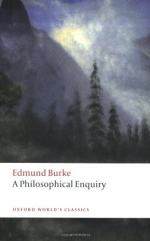
|
| Name: _________________________ | Period: ___________________ |
This quiz consists of 5 multiple choice and 5 short answer questions through Part II, Sections X - XXII.
Multiple Choice Questions
1. How do all emotions and passions affect the human mind?
(a) With scarring, searing effects.
(b) By natural, uniform, predictable principles.
(c) With unpredictable, greatly varying effects.
(d) By forcing the mind to yield to the heart.
2. What is Burke's argument that infinity exists in pleasing objects?
(a) Infinity itself is a pleasant concept, so an infinite object must be pleasant.
(b) The only truly pleasing object is the night sky, which is truly infinite.
(c) Humans are pleased by the unlimited potential of these objects.
(d) Pleasantness is a feeling that goes on forever within our minds.
3. What does Burke mean by the word "Taste?"
(a) Those faculties of the mind which form judgments upon the work of the imagination and the elegant arts.
(b) The sense of distinction that the higher social classes have above the lower social classes.
(c) The sense of taste located on the tongue, which distinguish sweet, salty, bitter, and sour flavors.
(d) The notions of personal style that refined, elegant people display when in public.
4. Why are certain drugs enjoyable, according to Burke?
(a) Because the users have no idea of the potential harm of the drug.
(b) Because the users only take them for their healthy properties.
(c) Because people can get them for a low cost.
(d) Because people become accustomed to their pleasurable effects.
5. What examples does Burke use to prove that people agree upon sensory observations?
(a) Sudden, loud sounds as opposed to quiet, soft sounds.
(b) Feelings of sharp or soft.
(c) The tastes of sweet, bitter, and sour.
(d) The pleasantness or unpleasantness of certain thoughts.
Short Answer Questions
1. What large part of text has Burke added between the First and Second editions?
2. Why, as Burke argues, are humans "more inclined to belief than to incredulity?"
3. What, according to Burke, is the cause of wrong "taste" in a person?
4. To which other passions is the idea of power closely related, according to Burke?
5. Why, according to Burke, is the idea of God sublime?
|
This section contains 448 words (approx. 2 pages at 300 words per page) |

|




